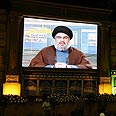
Nasrallah. Scheming?
צילום: AFP
The target: Jerusalem
Op-ed: Accurate Hezbollah rocket arsenal makes symbolic Jerusalem sites a potential target
Syria’s president and Hezbollah’s secretary general do not believe a word coming out of Israel. Assad and Nasrallah perceive everything that happens here as a scheme; in their view, the Israelis are always cooking up something. Even the forged so-called “Galant document” is some kind of deception in their eyes. They just haven’t figured it out yet.
We can reasonably assume that Major General Gadi Eisenkot’s decision to stay on as Northern Command chief is also perceived as a trick that has to do with Israeli preparations for confrontation. After all, it’s impossible for an officer to refuse a defense minister or army chief’s request to become deputy chief of staff. For Assad and Nasrallah there’s no such thing. There’s no other possibility: Everything is about schemes.
Meanwhile, for the Iranian-Syrian coalition, Iraq’s weakening and Saudi Arabia’s military buildup (the recent $60 billion arms deal,) along with the Israeli-Palestinian talks, are processes that call for action. Moreover, the Iranians are still preparing for an American-Israeli offensive which they’re sure will come.
Yet the current threat on our north includes implications we haven’t seen in the past. If, for example, Israelis were certain that Jerusalem and its holy sites will always remain out of bounds for the missiles – because it’s unimaginable that the Syrians or Iranians will hit the Temple Mount, Church of the Holy Sepulchre, any other Muslim or Christian holy site, or the Arabs of east Jerusalem - this assumption is invalid given the new realities. If Israelis viewed Jerusalem as a refuge for a cloudy day where they can escape to once missiles start landing in central Israel, this perception is over.
Iron Dome around Jerusalem?
Hezbollah’s dramatic armament process, where it equipped itself with long-range, accurate rockets (such as the M-600 missiles,) turns west Jerusalem into an attractive target. And if missile also constitute a terror weapon aimed at undermining morale, Israel’s capital is a wonderful target given the many symbolic sites there: The Knesset, government offices, the High Court of Justice, and so on. On top of it, the accurate rockets and missiles minimize the possibility of harming east Jerusalem residents.
The IDF Home Front command is already addressing this threat, and the above statements are openly presented to the heads of Jerusalem-area municipalities. Nasrallah talks about reciprocity, and we may end up discovering batteries of the anti-missile Iron Dome system deployed around the capital.
Meanwhile, rockets from Gaza already have an 80-kilometer (roughly 50 miles) range, reaching all the way to Kfar Saba, northeast of Tel Aviv. We won’t be surprised to discover in a year or two that these rockets already have a 100-kilometer range. This is the pace of rocket development in the Strip.
The military conclusion from these changes is as follows: The next war may require the IDF to start with deterring blows – in Syria, Lebanon and Gaza – because taking over territory is a long process that exacts many casualties.
And then there’s the diplomatic conclusion: An agreement with the Palestinian Authority is not the ultimate solution that will allay the tensions in the region. At best, such deal may be an (important) step en route to a regional agreement.










